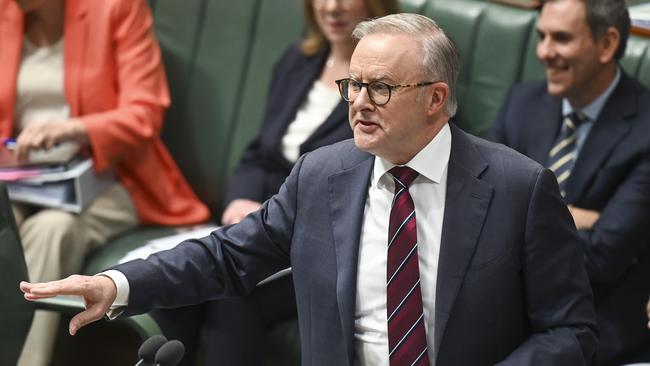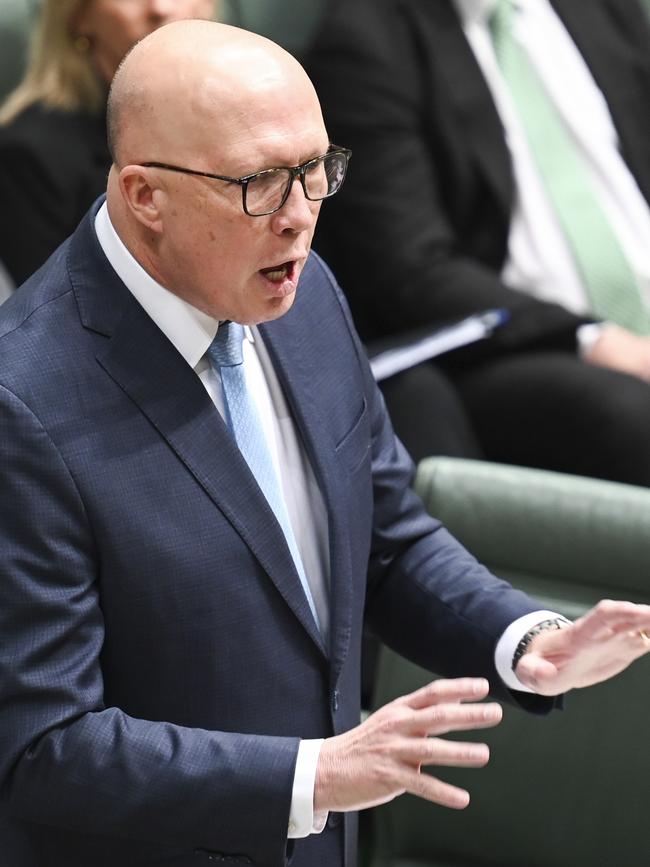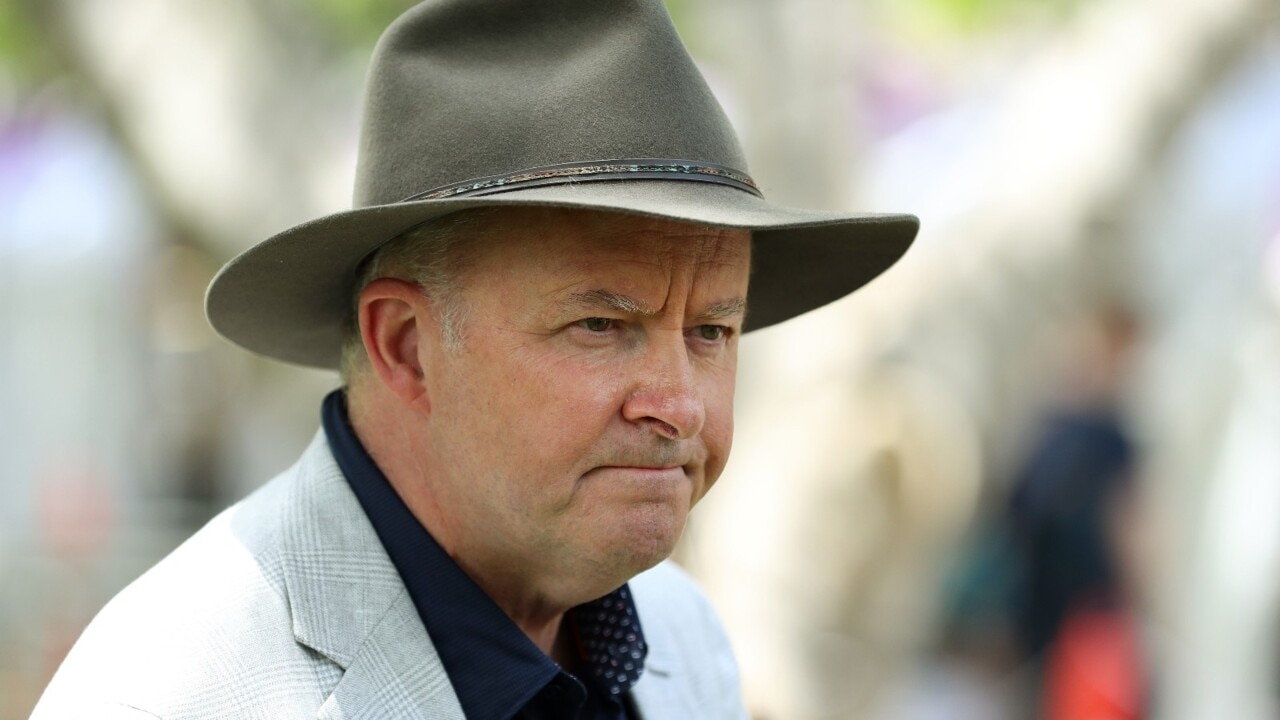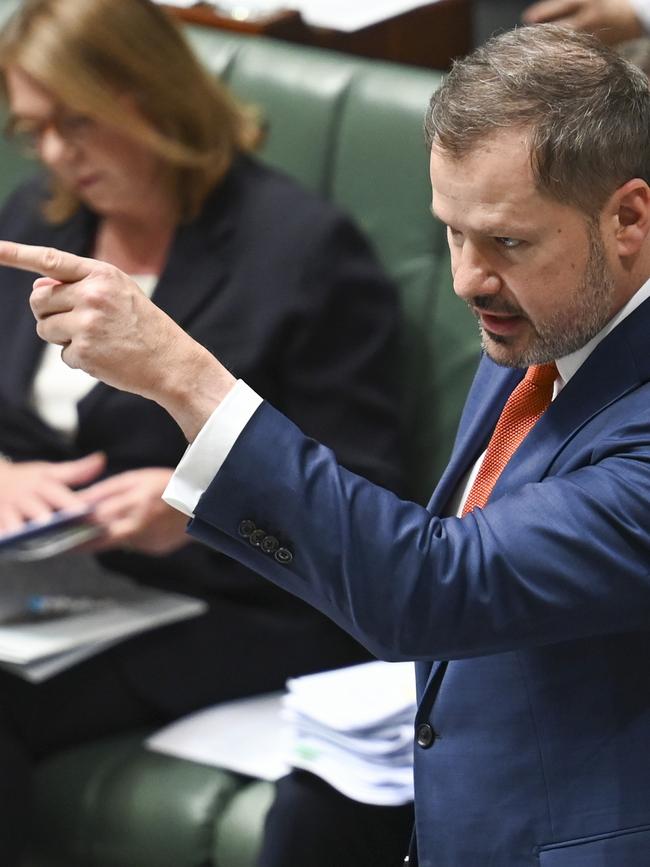
The fight over migrants from Gaza is a reflection of these very different attitudes.
Peter Dutton is against anyone coming from a terrorist-controlled war zone because, in the absence of robust security checks, we can’t be sure they’re going to be constructive contributors to Australia. His critics (Zali Steggall explicitly and Anthony Albanese implicitly) say he’s a racist to question their right to come here and we should let as many as possible in, even though none of Gaza’s Muslim neighbours do for fear of Islamist extremism.
The truly bizarre aspect to the Albanese government’s issue of nearly 3000 tourist visas to people from Gaza is that it seems to have happened almost by accident: without any caucus debate and certainly without any formal public announcement.
As a matter of normal government policy, visitors from countries where there’s a serious risk that they may not go back are routinely subject to more rigorous checks and frequent refusals.
Yet within scarcely a month of the October 7 atrocity and Israel’s response, more than 700 tourist visas were issued to people from Gaza – a fact that emerged only because a journalist asked about it, after word started to circulate within the local Palestinian diaspora.
And the nearest the government has come to an explanation for what it has done is Industry Minister Ed Husic’s observation last weekend that it had deliberately issued visitor visas because that was quicker than refugee visas (less checking) to help people escape a humanitarian crisis. Even though, from the outset, there was no expectation that any of them would return.

Hence the suspicion that this whole business was something hurriedly cooked up between the Prime Minister and former immigration minister Andrew Giles, in the wake of October 7, as a goodwill offering to the Greens and to Muslim activists threatening to campaign against Labor cabinet ministers. And likely absent intelligence input from ASIO which, as was later revealed, had been removed from the national security committee of cabinet by Albanese.
It’s an extraordinary failure of governance to admit thousands of people from a terrorist-controlled war zone without any obvious formal process, blind to risks and logistics, and without any explicit formal explanation and justification to the public – as occurred, for instance, when the Howard government gave safe haven visas to 4000 Kosovars during the messy break-up of Serbia, and when the Abbott government admitted 12,000 members of persecuted minorities from the Syrian war zone.
In that instance, those coming here were interviewed by Australian officials in Jordan, biometrically tested, and checked against national security watch lists. And invariably they were people who’d been displaced by our enemy, Islamic State, not by our friend, Israel, so could be supposed to have a broad sympathy for Western democracy.
Make no mistake: hardly anyone who comes here from Gaza will ever go back, regardless of the visa they arrive on. If people from Gaza want to stay forever (and who, once here, would not?) they can apply for permanent protection and drag out any appeal process almost indefinitely as some 500 of the 1300 who’ve so far arrived already have.
Given that any checking to date has been rudimentary (with immigration officials admitting in February that some visas had been issued in under one hour), the open question now is what kind of Australians would people from Gaza make; and what hard-to-shake prejudices might they bring with them?

After all, this is a terrorist statelet where most people are educated from infancy to regard Jews as evil and the West as oppressors. And where non-conformists on political, religious and sexual grounds routinely are killed, sometimes with extreme savagery.
Is the typical Gazan going to be a net benefit to Australian society or is that simply an irrelevant, perhaps even an immoral consideration, given that they’re coming from a conflict where they could be collateral damage in Israel’s just war?
Perhaps the most significant fact to emerge from the whole tortured process of trying to drag detail from a government that refuses to be transparent has been the boss of ASIO’s admission that “rhetorical” support for Hamas would not disqualify people from coming to Australia.
When newcomers arrive in any numbers, over time the country alters to be more like them; and that’s not always a bad thing. That’s why any debate over who’s coming to Australia is ultimately a debate about the nature of the country itself and what we want for our future.
It’s telling that the first major piece of legislation considered by the federation parliament was the Immigration Restriction Act.
Ironically, in those days it was Labor MPs who were most vociferously against permissive immigration polices on the ground that it would dilute our egalitarianism and drive down wages and living conditions. MPs in what was shortly to become to first version of the Liberal Party, were more likely to think well of people regardless of race or culture.
For instance, the free-trader Bruce Smith said: “It is a humiliating confession that the principal reason for shutting out (Asians) is, not that they are a low type of humanity or a degraded people, but they are too thrifty. They work too hard, and they are too provident, and they possess so many of those old-fashioned virtues that we Britishers cannot compete with.”

Perhaps the most ferocious supporter of what was to become known as the White Australia policy was the future Labor prime minister (albeit one who then split with his party over conscription for the Great War) Billy Hughes, who said: “We object to these people because of their vices and of their immorality and because of a hundred things that we can only hint at.”
In more recent and more fair-minded times, it’s the debate about what multiculturalism really means that has separated those who are proud of Australia, and want to preserve it, from those who are embarrassed about our country and want to change it.
Essentially, this has pitted those who believe in a civic patriotism against those who support ethnic separatism. Or Team Australia, where everyone is expected to subscribe to core values, against Hotel Australia, where all we have in common is living within the country’s borders.
Wherever you stand on this critical issue, and what sort of Australia you want for the future, it’s not something that governments should be allowed to decide in secret, without sober advice from agencies and then only revealed because the media caught them out. And yet that is where we are.







Do we accept immigrants because we’re a decent country that welcomes people seeking a better life by working hard and accepting Australian values? Or must we accept immigrants because we’re a rich country with an obligation to help others and a duty to atone for our racist past?